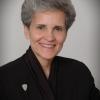"Let the children alone, and do not hinder them from coming to me; for the kingdom of heaven belongs to such as these."
The man who served a prison term for the 1995 murder of a Franciscan Clarist nun said that the forgiveness shown to him by the slain nun's family has given him "new life."
Samandhar Singh told Catholic News Service that he experienced a "rebirth" during a 2002 visit by Sr. Selmy, the younger sister of slain Sr. Rani Maria Vattalil, while he was in prison.
See for Yourself - “. . . she turned around and saw Jesus there, but did not know it was Jesus.” (Jn 20: 14)
Safe motherhood in Port Harcourt - Sr. Vivien Okereke is medical director of Our Lady Health of the Sick Hospital in Port Harcourt, Nigeria. In a country with one of the highest rates of maternal mortality in the world, health education for expectant and new mothers is important. Okereke, a member of the Congregation of the Handmaids of the Holy Child Jesus, urges women to bring their husbands to her “safe motherhood” classes and to find ways to set aside money that they can spend themselves on their own healthcare.
GSR Today - Sometimes we have to do what we’re called to do, even when it’s hard – especially when it’s hard, perhaps. When people are at their worst – when they’re racist, sexist, violent and mean – as Christians, we are still called to love them.
GSR Today - The Major League Baseball season in the United States ended this week with the San Francisco Giants beating my hometown the Kansas City Royals in the World Series. But the Royals had a particularly ardent group of supporters on their side. Read on.
It is my hope that the presence of so many religious sisters and other women at the transitional justice conference signals a new direction to peace-building initiatives. Society can no longer neglect the feminine principles in this all-important aspect of our lives on this planet: a peaceful coexistence. The way forward in peace-building in Africa rests on a change of mentality, a change of mentality seeded in the African system of values, particularly the traditional process for restorative justice.
Three Stats and a Map - Ebola is about more than just healthcare. As Melanie Lidman, Global Sisters Report’s Africa and Middle East correspondent, reported earlier this month, when an epidemic meets an already fragile social infrastructures, the reverberations are felt on multiple levels. One perhaps surprising example of this is the effect Ebola has had on the world’s chocolate industry.
GSR Today - We share the story of Sr. Ann Kelly and two other Missionary Sisters of the Holy Rosary who are using their education network in Liberia to educate people about how Ebola spreads. Where they are, the number of cases is currently dropping.
Financial education to help sisters “manage the little resources they have” on road to self-sufficiency - As American and European donations to Catholic organizations decline, congregations in Africa are trying to come up with creative ways to maintain the programs that provide essential services in rural areas, often beyond the reach of the government services. One innovative approach is securing education so that sisters can take charge of their finances, to help congregations become financially self-sufficient.





